Invoices to Arbitration: Court Orders Dispute Settlement Through Arbitrator.
20 May 2024
Arbitration Law >> Business & Commercial Law | Business Laws >> Business & Commercial Law
A recent court order has shed light on a disagreement between a manufacturer and a customer, ultimately directing the case to arbitration. The manufacturer, a producer of corrugated boxes and cartons, is seeking payment for delivered goods from the customer.
Background:
The manufacturer alleges the customer owes them ?36,40,060 (Rupees Thirty Six Lakhs Forty Thousand Six Only) for supplied boxes and cartons. Invoices issued by the manufacturer reportedly included an arbitration clause, granting Delhi courts jurisdiction over any disputes. However, the customer contested the arbitration clause's validity and argued they had already settled the outstanding amount with the manufacturer through a written agreement dated June 12th, 2023. The customer contended that this agreement superseded the arbitration clause in the invoices.
Court Recognizes Arbitration Clause:
The court acknowledged the presence of an arbitration clause within the manufacturer's invoices. They determined that the "consent letter" provided by the customer did not constitute a definitive settlement agreement, leaving room for a potential arbitrable dispute.

Dispute to be Settled Through Arbitration:
The court upheld the manufacturer's right to have the disagreement resolved through arbitration. Consequently, they directed the case to an arbitral tribunal for a formal hearing. Mr. Brajesh Kumar Tamber was appointed as the sole arbitrator to oversee the case. The arbitration proceedings will be conducted under the regulations of the Delhi International Arbitration Centre (DIAC).
Conclusion:
The court emphasized that both parties retain the right to present their arguments regarding the dispute's arbitrability, along with any preliminary objections or claims related to the case's merits. The appointed arbitrator will have the final say on these matters. The court mandated that both parties approach the designated arbitrator within two weeks of the order's issuance. This paves the way for a formal arbitration process to determine the outcome of the financial disagreement between the manufacturer and the customer.
Arbitration and Conciliation Act, 1996
